小学五年级英语下册
闽教版小学英语五年级下册全册课文文本
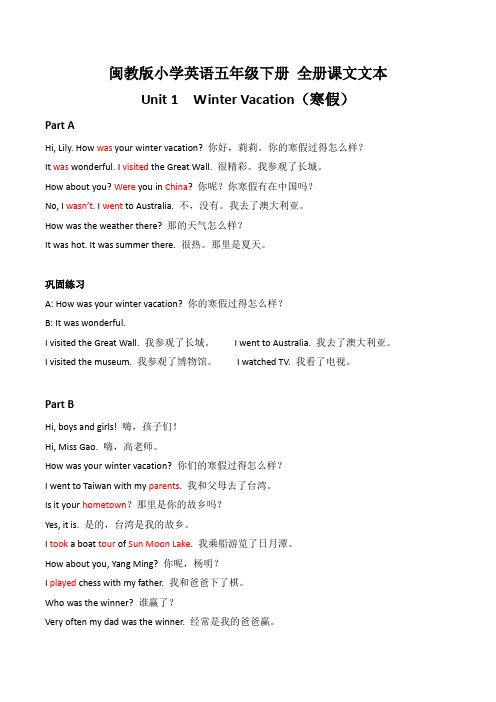
闽教版小学英语五年级下册全册课文文本Unit 1 Winter Vacation(寒假)Part AHi, Lily. How was your winter vacation? 你好,莉莉。
你的寒假过得怎么样?It was wonderful. I visited the Great Wall. 很精彩。
我参观了长城。
How about you? Were you in China? 你呢?你寒假有在中国吗?No, I wasn’t. I went to Australia. 不,没有。
我去了澳大利亚。
How was the weather there? 那的天气怎么样?It was hot. It was summer there. 很热。
那里是夏天。
巩固练习A: How was your winter vacation? 你的寒假过得怎么样?B: It was wonderful.I visited the Great Wall. 我参观了长城。
I went to Australia. 我去了澳大利亚。
I visited the museum. 我参观了博物馆。
I watched TV. 我看了电视。
Part BHi, boys and girls! 嗨,孩子们!Hi, Miss Gao. 嗨,高老师。
How was your winter vacation? 你们的寒假过得怎么样?I went to Taiwan with my parents. 我和父母去了台湾。
Is it your hometown?那里是你的故乡吗?Yes, it is. 是的,台湾是我的故乡。
I took a boat tour of Sun Moon Lake. 我乘船游览了日月潭。
How about you, Yang Ming? 你呢,杨明?I played chess with my father. 我和爸爸下了棋。
译林版英语小学五年级下册--课文翻译(汉英对照)
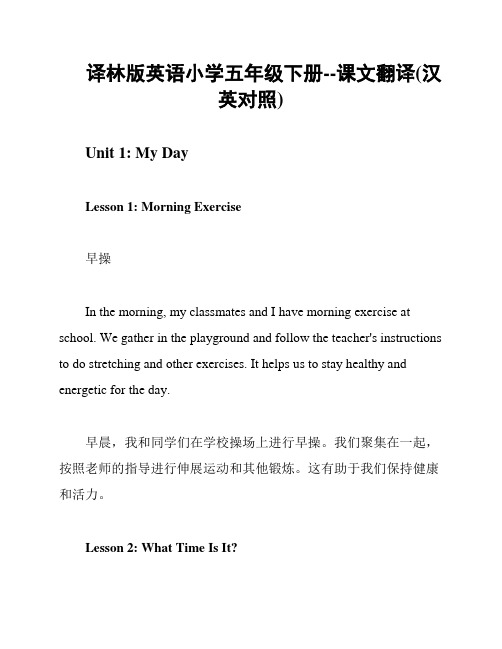
译林版英语小学五年级下册--课文翻译(汉英对照)Unit 1: My DayLesson 1: Morning Exercise早操In the morning, my classmates and I have morning exercise at school. We gather in the playground and follow the teacher's instructions to do stretching and other exercises. It helps us to stay healthy and energetic for the day.早晨,我和同学们在学校操场上进行早操。
我们聚集在一起,按照老师的指导进行伸展运动和其他锻炼。
这有助于我们保持健康和活力。
Lesson 2: What Time Is It?几点钟了?In this lesson, we learn how to tell time in English. The teacher shows us a clock and asks different students to tell the time. We practice using phrases like "It's six o'clock" and "It's half past nine". Telling time in English can be tricky, but it's an important skill to learn.在这节课上,我们研究如何用英语报时。
老师给我们展示了一个钟表,并让不同的同学报时。
我们练使用诸如"It's six o'clock"和"It's half past nine"等短语。
五年级英语下册作文(优秀10篇)

五年级英语下册作文(优秀10篇)成功需要成本,时间也是一种成本,对时间的珍惜就是对成本的节约。
以下内容是牛牛范文为您带来的10篇五年级英语下册作文,如果能帮助到亲,我们的一切努力都是值得的。
五年级英语下册作文篇一Hello, every one. I am a boy in Class 4 Grade 5. I like reading very much. A good book is a good friend. I often play with this good friend. Every day, after finishing my homework, I will share my spare time with my book happily. Usually my book will tell me some funny stories. Sometimes it shares some thought with me. I can learn a lot from the book. It makes me happy. It makes me sad. It makes me brave. It makes me independent. I love my friend so much. Do you love your friend? Do you love your books?大家好。
我是5年级6班的一个男生。
我非常喜欢阅读。
一本好书是一个好朋友。
我经常和这个好朋友玩耍。
每一天,完成我的作业后,我会高兴地和我的书度过闲暇的时光。
通常我的书会告诉我一些有趣的故事。
有时候它与我分享一些想法。
我可以从书中学到很多。
它让我快乐,让我伤心,也让我勇敢,让我变得独立。
我非常爱我的朋友。
你爱你的朋友吗?你爱你的书吗?小学五年级下册英语作文篇二I like to travel to different places,I can see the beautiful scenery and get to know the different cultures.My friends and I always travel together,we make many plans in advance.But the plans will always be interrupted by all kinds of unexpected incidents,like the bad weather,the holiday being cancelled,so we have to spend another time to wait for the trip.Traveling alone can ignore these problems,I can go to travel whenever I want,I just need to pick up my backpack,and then buy the ticket.It is so free,I don’t have to wait for others,I can go to the places I want alone is good.小学五年级下册英语作文篇三Today,I will tell you an insect.It has six legs and four wings.Its eyes are big.Its body is long.What is it?Of course it is a dragonfly.It’s a good insect.It eats moths,bees and mosquito.Thereour country.It has a pair of compound eyes that composed of 28000 small eyes.The dragonfly flies very fast.Sometimes it can fly 100 miles in an hour.I like the dragonfly.小学五年级下册英语作文篇四Today is the first day of the mother on a business trip.In the morning,I#39;m still in his sleep,but a mother opened his eyes can#39;t see.It turns out that mother left at 7 o #39;clock,I was sad.Mother was gone,grandpa will be coming to meet me,my father and I also moved to grandma#39;s to wish I also eat not to eat sweet,or even sleep also can not sleep at isn#39;t at home was slow! When I think of mom,remembered before and mother together of the good time,I couldn#39;t help crying.Mom was not at home these days,I be brave.Ah,how I look forward to hurry up to Friday because mom will come back on Friday!小学五年级下册英语作文篇五There is a zoo near my house.The zoo is very big and very beautiful ,the zoo has some kinds of animals ,pandas,lions,tigers,elephants,monkeys.Panda is very cute and very fat ,but it is not my favourite animal.Lion is very strong ,but it isn’t my favourite animal ,because it isn’t very handsome.Tiger is very strong and very handsome ,it’s my favourite animal,because it’s very strong and very handsome.Elephant is tall and strong .it likes carring is not very quiet.五年级英语下册作文篇六happy winter holidayI have got a happy winter holiday this year. In this year, I have a 7-day winter holiday. In the first day, I went back to my hometown with my parents. When I got there, I saw my grandparents. Then we had lunch together. At that time, we not only had dilicious food,we also talk about our wonderful life. We laughed and sang, it was so happy then. After lunch, I got out and found my old friends in the field. They were all taller and stronger than before. We sat down on the ground and talk about funny things. It was so interesting and fun.快乐的寒假今年我过了一个愉快的寒假。
(完整版)小学英语人教PEP五年级下册新版(课文+单词表)
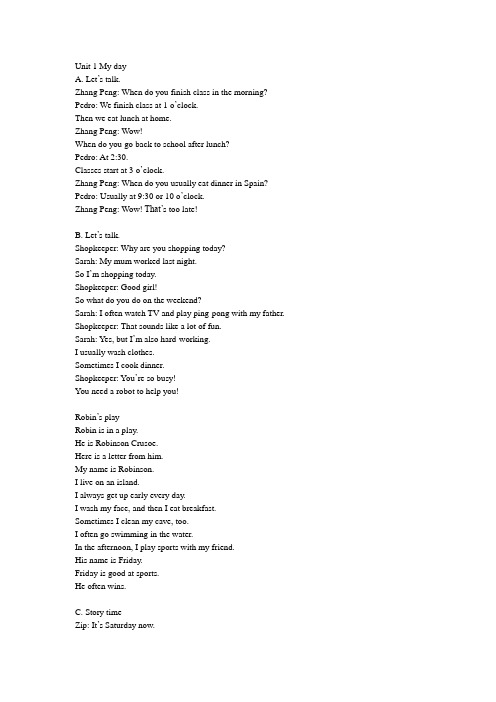
Unit 1 My dayA. Let’s talk.Zhang Peng: When do you finish class in the morning? Pedro: We finish class at 1 o’clock.Then we eat lunch at home.Zhang Peng: Wow!When do you go back to school after lunch?Pedro: At 2:30.Classes start at 3 o’clock.Zhang Peng: When do you usually eat dinner in Spain? Pedro: Usually at 9:30 or 10 o’clock.Zhang Peng: Wow! That’s too late!B. Let’s talk.Shopkeeper: Why are you shopping today?Sarah: My mum worked last night.So I’m shopping today.Shopkeeper: Good girl!So what do you do on the weekend?Sarah: I often watch TV and play ping-pong with my father. Shopkeeper: That sounds like a lot of fun.Sarah: Yes, but I’m also hard-working.I usually wash clothes.Sometimes I cook dinner.Shopkeeper: You’re so busy!You need a robot to help you!Robin’s playRobin is in a play.He is Robinson Crusoe.Here is a letter from him.My name is Robinson.I live on an island.I always get up early every day.I wash my face, and then I eat breakfast.Sometimes I clean my cave, too.I often go swimming in the water.In the afternoon, I play sports with my friend.His name is Friday.Friday is good at sports.He often wins.C. Story timeZip: It’s Saturday now.Zoom, I’m always very busy.Zoom: Why?Zip: Let me see.From Monday to Wednesday, I usually collect nuts in the afternoon. Zoom: What else?Zip: On Thursday, I often dry my nuts in the sun.Zip: On Friday, I eat nuts with my friends.Zoom: What do you usually do on the weekend?Zip: I often watch TV, but this weekend I have a show.I’ll play the pipa.Zoom: When?Zip: Saturday, at 12 o’clock.Oh, no!Words in unit 1eat breakfast 吃早饭have … class上……课play sports 进行体育运动exercise 活动;运动do morning exercises 早锻炼eat dinner 吃晚饭clean my room 打扫我的房间go for a walk 散步go shopping 去买东西;购物take 学习;上(课)dancing 跳舞;舞蹈take a dancing class 上舞蹈课when 什么时候;何时after 在(时间)后start 开始usually 通常地;惯常地Spain西班牙late晚;迟a.m. 午前;上午p.m. 午后;下午why 为什么shop 去买东西;购物work 工作last 上一个的;刚过去的sound 听起来好像also 还;也busy忙的need 需要play 戏剧;剧本letter 信for 表示接受某事物的人live 居住island 岛always 总是,一直cave 山洞;洞穴go swimming 去游泳win 获胜Unit 2 My favourite seasonA. Let’s talkMr Jones: Do you like the music, children?Mike: Yes. It’s very beautiful.What is it?Mr Jones: The Four Seasons.Today we’ll draw the seasons.Which season do you like best, Mike?Mike: Winter. I like snow.Mr Jones: I like snow, too.Which season do you like best, Wu Yifan?Wu Yifan: Spring. It’s pretty.Mr Jones: Yes, it is.B. Let’s talkAmy: Hello, Miss White.Look at my picture.Miss White: Good job!I like the trees.The colours are very pretty.Amy: Yes. I like autumn best.The weather is good and the colours are beautiful!Which season do you like beat, Miss White?Miss White: Summer.Amy: Why?Miss White: Because I like summer vacation!Robin likes them all!Look at the green trees and pink flowers.I like spring because there are beautiful flowers everywhere. The weather is hot, hot, hot!I like summer, but I can’t swim.What lovely colours!The leaves fall and fall and fall.I love fall!Wow! I want to paint a picture, too!There is lots of snow.It is white everywhere.I like winter because I can play in the snow.Story timeZip &Zoom: Welcome!Koala: Thank you. Merry Christmas!Zip &Zoom: Merry Christmas!Zoom: What do you usually do on Christmas Day?Koala: I usually go to the beach and swim in the sea!Zoom: You swim in winter?Koala: Christmas is in summer in Australia, so we never have snow for Christmas. Zoom: Which season do you like best?Koala: Summer. I like sunny days.Koala: Wow! A white Christmas!Zoom: Let’s make a snowman.Zip &Koala: Great!Zip: Say “cheese”!Koala: Cheese!Words in unit 2spring 春天summer 夏天autumn 秋天winter 冬天season 季节picnic 野餐go on a picnic 去野餐pick 摘;采集pick apples 摘苹果snowman 雪人make a snowman 堆雪人go swimming 去游泳which 哪一个best 最好地snow 雪good job做得好because 因为vacation 假期all 全,完全pink 粉色;粉色的lovely 可爱的;美丽的leaf 叶子fall 落下;【美】秋天paint 用颜料绘画Unit 3 My school calendarA – Let’s talk.Mike: We have a few fun things in spring. After the sports meet, we have an Easter party. Zhang Peng: When is the party?Mike: It’s in April.We have a school trip, too.Zhang Peng: When is that?Mike: It’s in May.Zhang Peng: Cool!B – Let’s talk.Oliver: Autumn is my favourite season.I really like the colours.Chen Jie: I like autumn, too.We usually have a school trip in autumn. Oliver: Great!When is the trip this year?Chen Jie: It’s in October.We’ll go to the Great Wall.Oliver: Cool!I love the Great Wall!B – Easter PartyWHEN: April 12th, 7 p.m.WHY: Easter holidayWHERE: Wu Yifan’s homeWHAT: We will play many games.We will roll Easter eggs.We will look for eggs.We will eat chocolate eggs.You will meet the Easter Bunny!RSVP: Will you come to the party?Please send me an email by March 23rd. Robin@.C – Story timeZoom: Look at my summer vacation plan! Zip: It’s April now.The summer vacation is still three months away. Zoom: Early planning is always good.Zoom: In July I’ll visit my grandparents.They live in Xinjiang.Zip: What will you do there?Zoom: We’ll go to the Grape Valley.The grapes there are very sweet!Grapes are my favourite fruit!Zoom: In August, I’ll go to Huangshan Moutain.The trees there are very famous.The clouds are beautiful.Zip: Sounds great!Zip: You have a great plan, but what will you do this weekend? Zoom: This weekend?Zip: There is a maths test next Monday.So please study hard.Zoom: Oh my! I forgot!Words in unit 3January 一月February 二月March 三月April 四月May 五月June 六月July 七月August 八月September 九月October 十月November 十一月December 十二月plant 种植contest 比赛;竞赛year 年few 一些a few 一些thing 事情meet 集会;开会sports meet运动会Easter 复活节trip 旅行national 国家的National Day 国庆日American 美国的Thanksgiving 感恩节Christmas 圣诞节Great Wall 长城holiday 假日;节日game 游戏roll 滚动look for 寻找chocolate 巧克力bunny (用作儿语)兔子RSVP(尤用于请柬)请赐复by 在……之前Recycle 1-1Sarah will visit Sydney in April.She asks Stella, a friend there, about the weather.Here is Stella’s reply.Hi, Sarah!It is autumn in April here in Sydney.Autumn is my favourite season!It is warm in the day and cool at night.Many people visit us in autumn because they like the weather. When you come, you can visit the Sydney Royal Easter Show. It is the largesse event in Australia.What is the weather like in April in you city?What do you often do?All best,StellaRecycle 1-2Sarah often reads to Sam.This is a poem that Sarah will read today.Bed in SummerBy Robert Louis StevensonIn winter I get up at nightAnd dress by yellow candlelight.In summer, quite the other way,I have to go bed by day.I have to go to bed and seeThe birds still hopping on the tree,Or hear the grown-up people’s feetStill going past me in the street.And does it seem hard to you,When all the sky is clear and blue,And I should like so much to play.To have to go to bed by day?Unit 4 When is Easter?A – Let’s talk.Mr Jones: There are some special days in April.Zhang Peng: What are they?Mr Jones: April Fool’s Day and Easter.Zhang Peng: When is April Fool’s Day?Mr Jones: It’s on April 1st.Zhang Peng: And Easter?Mr Jones: It’s on April 5th this year.Zhang Peng: Wow! I love April.B—Let’s talkChen Jie: When is your birthday?Mike: My birthday is on April 4th.Chen Jie: That’s my mother’s birthday, too!Mike: Cool! What will you do your mum?Chen Jie: I’ll cook noodles for her.Mike: Chinese noodles are delicious!Chen Jie: Please come then. We can have a birthday party for both of you!Two new kittensSarah’s cat has two kittens.Read Sarah’s diary.April 15thMy cat has two new kittens.They are pink, because they are very young.They still can’t see.April 21stThe kittens are six days old.They make noises when they are hungry.They have white fur now.They are cute.April 26thTheir eyes are open!They are blue.May 3rdThe kittens can walk now.They can play with Robin!C—Story timeApril 30thMusic teacher: The singing test will be on May 4th.Zoom: I can’t sing well.Zip: Don’t worry.Practice makes perfect.May 1stZip: Will you come to the party?Today is Rabbit’s birthday.Zoom: Sorry, I can’t.I want to practise my song.May 2ndRabbit: Will you play football with me after school? Zoom: Sorry, I can’t.I want to practise the song.May 3rdCat: Let’s watch TV together.Zoom: Sorry. I need more practice.May 4thMusic teacher: Good job, Zoom.Zoom: Thank you, Miss Bird.Cat: I’ll go swimming tonight.Will you go?Zoom: Of course!Words in unit 4first (1st)第一的second (2nd)第二的third (3rd)第三的fourth (4th)第四的fifth (5th)第五的twelfth (12th)第十二的twentieth (20th)第二十的twenty-first (21st)第二十一的twenty-third (23rd)第二十三的thirtieth (30th)第三十的fool 蠢人;傻瓜special 特别的;特殊的kitten 小猫diary 日记still 仍然;依旧;还是noise 声音;响声(尤指)噪音fur (某些动物的)浓密的软毛open 开着的walk 行走Unit 5 Whose dog is it?A—Let’s talkChen Jie: The yellow picture is mine.Are these all ours?Mike: Yes, they are.Chen Jie: Wow! That picture of Beijing is beautiful. Whose is it?Mike: It’s Zhang Peng’s.Chen Jie: Look! There is a picture of Shanghai, too.Mike: It’s Yifan’s.Chen Jie: Oh, yes! It’s his.B—Let’s talk(Sam is at Chen Jie’s home.)Sam: Where is Fido now?Chen Jie: He’s in the kitchen.Sam: Is he drinking water?Chen Jie: No, he isn’t.He’s eating.Sam: Can I play with him now?Chen Jie: Yes. Can you take him to the park? Sam: Woof, woof!Robin at the zooSarah and Robin are at the zoo.Robin is excited!I’m looking at a bear.I’m dancing like a bear.I’m looking at the rabbits.I’m eating like a rabbit.I’m looking at a tiger.I’m running like a tiger.I’m looking at an elephant.I’m walking like an elephant.I’m looking at a monkey.I’m climbing like him.I’m looking at a bird.I like flying.I want to be a bird.Robin, do you want to swim like a fish?No! No! I don’t want to be a fish!C—Story timeZip: Here comes a tiger.Zoom: Where is it?Zip: Shh. Be quiet.Zoom: Ah-choo!Zip: Whose tail is that?It’s running so fast.Zoom: Is it the tiger?Zip: Yes, it is.Zip: I see two monkeys.Zoom: Where are they?Zip: Shh. They’re climbing.Zoom: Wow! They’re fast, too.Zoom: What are they doing?Zip: Why are they looking at us?Zoom: I don’t know.Zip: Look! They’re taking pictures, too.Zoom: That’s cute.They’re copying us!Words in unit 5mine 我的yours 你(们)的his 他的hers 她的theirs 他们的;她们的;它们的ours 我们的climbing (climb的-ing形式)(正在)攀登;攀爬eating(eat的-ing形式)(正在)吃playing(play的-ing形式)(正在)玩耍jumping(jump的-ing形式)(正在)跳drinking(drink的-ing形式)(正在)喝(水)sleeping(sleep的-ing形式)(正在)睡觉each 每一;各个other 其他的each other 相互excited 兴奋的;激动的like 像……那样Unit 6 Work quietly!A—Let’s talkChen Jie: Look at the pandas.Mike: What are they doing?Chen Jie: Haha. They’re eating lunch!They’re so cute.Mike: Oh, yes! They like bamboo.Chen Jie: What’s the little monkey doing?Mike: it’s playing with its mother!Chen Jie: Do you see any elephants?Mike: Yes! Look there!The elephant is drinking water.B—Let’s talkTom: My name is Tom.What’s your name?John: Shh. Talk quietly.I’m John.I can show you the English books. Tom: Thanks.John: Here they are.Tom: OK. Can I read the books here? John: Yes. Of course.Tom: Anything else?John: Yes. Keep your desk clean. Tom: OK, I will.Thanks.The world robot exhibitionNi hao. Ni zai gan shen me ne? Sorry. What are you saying?I’m speaking Chinese.Oh, hello.What are you doing?I’m drawing a picture.Have a look.It’s lovely.Are you cooking?Yes. I’m cooking rice.Asako is making sushi.Can we play music with you? Sure. Please take turns.Are you from China?Yes, I am.You’re so cool!Can you teach me?Sure!Are you doing kung fu?Yes, I am.I’ll show you.C—Story timeZip: I love the film.Zoom: Yes. The gorilla is great!Zip: Wow! The gorilla is eating bananas.Zoom: It’s so big and strong.Zip: What’s that noise?Zoom: I’m eating popcorn.Zip: It’s so exciting!Zoom: Yes, it is!Tiger: Shh! Talk quietly!Zoom: Sorry!Zip: Look at the sign.Zoom: Oh, no!Words in unit 6doing morning exercises(正在)早锻炼having … class(正在)上课eating lunch(正在)吃午饭reading a book(正在)看书listening to music(正在)听音乐keep保持某种状态keep to the right靠右keep your desk clean 保持你的课桌整洁talk quietly 小声讲话turn 顺序take turns 按顺序来bamboo 竹子its它的;他的(指事物、动物或幼儿)show 引导;指引anything 任何事物else 另外;其他exhibition 展览say 说;讲have a look 看一看sushi 寿司teach 教Canadian 加拿大的Spanish 西班牙的Recycle 2Thirty days has September, April, June and November; February has twenty-eight alone.All the rest have thirty-oneExcept in leap year.That’s the timeWhen February’s days are twenty-nine.。
译林小学英语五年级(下册)(全册)重点
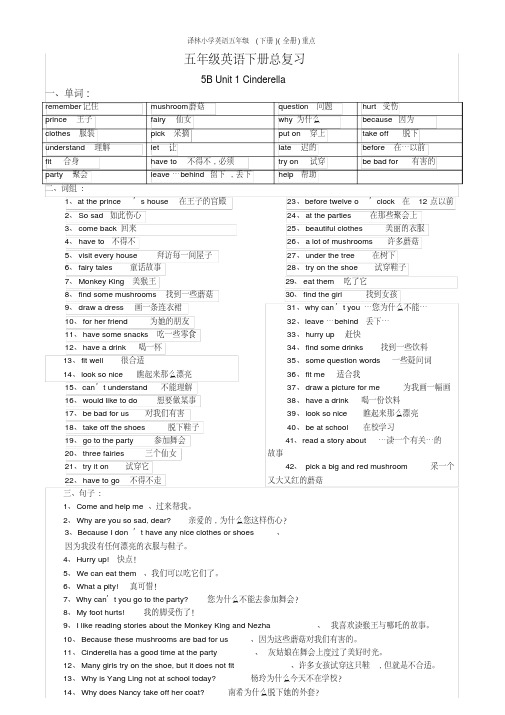
五年级英语下册总复习5B Unit 1 Cinderella一、单词:remember记住mushroom蘑菇question问题hurt受伤prince 王子fairy仙女why 为什么because 因为clothes服装pick 采摘put on 穿上take off 脱下understand 理解let 让late 迟的before 在…以前fit 合身have to 不得不,必须try on 试穿be bad for 有害的party 聚会leave…behind 留下,丢下help 帮助二、词组:1、at the prince’s house在王子的宫殿2、So sad 如此伤心3、come back回来4、have to不得不5、visit every house拜访每一间屋子6、fairy tales童话故事7、Monkey King 美猴王8、find some mushrooms找到一些蘑菇9、draw a dress画一条连衣裙10、for her friend 为她的朋友11、have some snacks吃一些零食12、have a drink喝一杯13、fit well 很合适14、look so nice瞧起来那么漂亮15、can’t understand不能理解16、would like to do想要做某事17、be bad for us 对我们有害18、take off the shoes 脱下鞋子19、go to the party 参加舞会20、three fairies 三个仙女21、try it on试穿它22、have to go不得不走23、before twelve o’clock 在12点以前24、at the parties在那些聚会上25、beautiful clothes 美丽的衣服26、a lot of mushrooms许多蘑菇27、under the tree 在树下28、try on the shoe试穿鞋子29、eat them 吃了它30、find the girl 找到女孩31、why can’t you…您为什么不能…32、leave…behind丢下…33、hurry up 赶快34、find some drinks 找到一些饮料35、some question words一些疑问词36、fit me 适合我37、draw a picture for me 为我画一幅画38、have a drink喝一份饮料39、look so nice 瞧起来那么漂亮40、be at school 在校学习41、read a story about…读一个有关…的故事42、 pick a big and red mushroom采一个又大又红的蘑菇三、句子:1、Come and help me、过来帮我。
小学五年级英语下册知识点归纳总结

英语下册知识点总结一、重点短语1. look at 看一看2. over there 在那边3. in English 用英语4. excuse me 打扰了5. in the pond 在池塘里6. play with 和… 一起玩7. of course 当然8. swim well 游泳好9. pet shop 宠物店10. a lot of 很多11. jump through a ring 越过圆环12. ride a horse 骑马13. ride a bike 骑自行车14. climb up a ladder 爬梯子15. come here 过来16. come along 过来17. come with me 跟我来18. show… around 带…参观19. this way 这边走20. borrow … from 从…借21. borrow books 借书22. read stories 读故事23. make things 制作东西24. speak English 说英语25. draw pictures 画画26. have art classes 上美术课27. dance room 舞蹈教室28. how often 多久一次29. science lab 科学实验室30. language lab 语音室31. how many 多少32. other activities 其他活动33. do experiments 做实验34. do listening 练听力35. observe things 观察事物36. do speaking 练口语37. New Year’s Day 元旦38. meeting hall 会议大厅39. Children’s Day 儿童节40. be good at 擅长41. be interested in 对…感兴趣42. music club 音乐俱乐部43. no one 没有人44. play the violin 拉小提琴45. art club 美术俱乐部46. come into 进入47. listen to music 听音乐48. cut out 剪下49. come from 来自50. up and down 上上下下51. in groups 成组52. science corner 科学角53. group work 小组活动54. do project work 做项目制作55. art corner 美术角56. computer corner 电脑角57. play football 踢足球58. be famous for 因…闻名59. study plants and animals 研究动植物 60. do exercises 做运动61. on the field 在操场上62. do printing on the paper 在纸上印刷 63. how about …怎么样?on field trips 田野考察65. play volleyball 打排球66. play basketball 打篮球67. play hockey 打曲棍球68. play rugby 打橄榄球69. in the forest 在森林里70. have a look at 看一看71. here you are 给你72. how much 多少(钱)73. a pair of 一双;一对74. try on 试穿75. shoe shop 鞋店76. clothes shop 服装店77. make a shopping list 做购物单78. sports shop 体育用品商店79. cake shop 蛋糕店80. pay for 付钱81. feel well 感觉好82. see a doctor 看医生83. take good care of 好好照顾84. have a bad cold 得了重感冒85. have a fever 发烧86. have a stomachache 胃疼87. have a headache 头疼88. have a toothache 牙疼89. have a cough 咳嗽90. go to a concert 听音乐会91. do maths problems 做数学题 92. go to the music club 去音乐俱乐部93. have to 不得不94. stay in bed 待在床上95. get well 康复 96. be worried about 担心97. don’t worry 别担心98. help … with 帮助…做某事99. in the hospital 在医院里二、重点短语讲解1. play with 和…一起玩play with sb.(某人) 和…一起玩 play with sth.(某物) 玩某物. Lucy and Lily are playing with their mother. Lucy and Lily are playing with their doll.2. a lot of 很多 a lot of = lots of + 可数名词复数或不可数名词. 同义句转换 There are a lot of apples on the table. = There are ______ ______ apples on the table. (答案:lots of)3. how often 多久一次how often 是一个特殊疑问词,就频率提问。
(完整版)人教版小学五年级下英语单词表
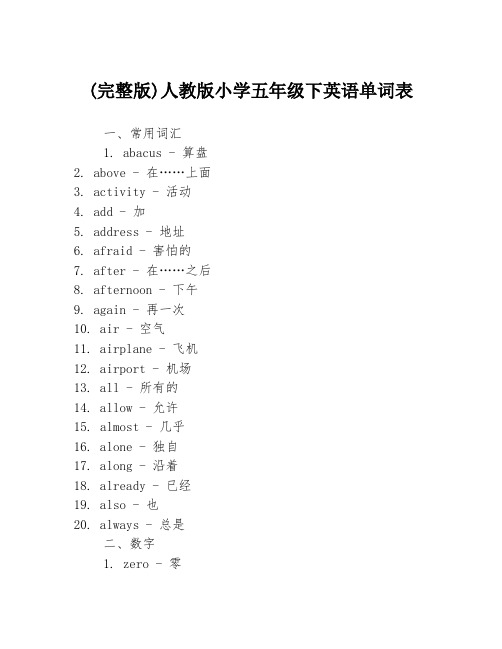
(完整版)人教版小学五年级下英语单词表一、常用词汇1. abacus - 算盘2. above - 在……上面3. activity - 活动4. add - 加5. address - 地址6. afraid - 害怕的7. after - 在……之后8. afternoon - 下午9. again - 再一次10. air - 空气11. airplane - 飞机12. airport - 机场13. all - 所有的14. allow - 允许15. almost - 几乎16. alone - 独自17. along - 沿着18. already - 已经19. also - 也20. always - 总是二、数字1. zero - 零2. one - 一3. two - 二4. three - 三5. four - 四6. five - 五7. six - 六8. seven - 七9. eight - 八10. nine - 九11. ten - 十12. eleven - 十一13. twelve - 十二14. thirteen - 十三15. fourteen - 十四16. fifteen - 十五17. sixteen - 十六18. seventeen - 十七19. eighteen - 十八20. nineteen - 十九21. twenty - 二十22. thirty - 三十23. forty - 四十24. fifty - 五十25. sixty - 六十26. seventy - 七十27. eighty - 八十28. ninety - 九十三、时间1. time - 时间2. clock - 时钟3. hour - 小时4. minute - 分钟5. second - 秒6. morning - 早上7. noon - 中午8. night - 晚上9. day - 白天10. week - 周11. Monday - 星期一12. Tuesday - 星期二13. Wednesday - 星期三14. Thursday - 星期四15. Friday - 星期五16. Saturday - 星期六17. Sunday - 星期天18. January - 一月19. February - 二月20. March - 三月21. April - 四月22. May - 五月23. June - 六月24. July - 七月25. August - 八月26. September - 九月27. October - 十月28. November - 十一月29. December - 十二月四、身体部位1. head - 头2. hair - 头发3. face - 脸4. eye - 眼睛5. nose - 鼻子6. ear - 耳朵7. mouth - 嘴8. tooth - 牙齿9. tongue - 舌头10. throat - 喉咙11. shoulder - 肩膀12. arm - 手臂13. hand - 手14. finger - 手指15. chest - 胸16. stomach - 肚子17. back - 背18. leg - 腿19. knee - 膝盖20. foot - 脚21. toe - 脚趾五、颜色1. red - 红色2. orange - 橙色3. yellow - 黄色4. green - 绿色5. blue - 蓝色6. purple - 紫色7. black - 黑色8. white - 白色9. gray - 灰色10. pink - 粉红色六、家庭成员1. family - 家庭2. parents - 父母3. mother - 母亲4. father - 父亲5. sister - 姐妹6. brother - 兄弟7. grandmother - 奶奶8. grandfather - 爷爷9. aunt - 姑妈、阿姨10. uncle - 叔叔、伯父七、动物1. animal - 动物2. cat - 猫3. dog - 狗4. rabbit - 兔子5. mouse - 老鼠6. bird - 鸟7. fish - 鱼8. turtle - 乌龟9. frog - 青蛙10. snake - 蛇11. horse - 马12. cow - 牛13. pig - 猪14. sheep - 羊八、食物1. food - 食物2. breakfast - 早餐3. lunch - 午餐4. dinner - 晚餐5. fruit - 水果6. apple - 苹果7. banana - 香蕉8. orange - 橙子9. grape - 葡萄10. strawberry - 草莓11. watermelon - 西瓜12. vegetable - 蔬菜13. carrot - 胡萝卜14. tomato - 西红柿15. potato - 土豆16. cucumber - 黄瓜17. eggplant - 茄子18. meat - 肉19. chicken - 鸡肉20. pork - 猪肉21. beef - 牛肉22. fish - 鱼肉23. shrimp - 虾九、衣服1. clothes - 衣服2. shirt - 衬衫3. T-shirt - T恤衫4. sweater - 毛衣5. jacket - 夹克6. pants - 裤子7. jeans - 牛仔裤8. dress - 连衣裙9. skirt - 裙子10. shoes - 鞋子11. socks - 袜子12. hat - 帽子十、学习用品1. pencil - 铅笔2. pen - 圆珠笔3. eraser - 橡皮4. ruler - 尺子5. scissors - 剪刀6. glue - 胶水7. paper - 纸8. notebook - 笔记本9. textbook - 教科书10. dictionary - 字典十一、交通工具1. car - 汽车2. bike - 自行车3. bus - 公交车4. train - 火车5. subway - 地铁6. taxi - 出租车十二、自然1. sun - 太阳2. moon - 月亮3. star - 星星4. sky - 天空5. cloud - 云6. rain - 雨7. snow - 雪8. wind - 风9. tree - 树10. flower - 花11. grass - 草12. mountain - 山13. river - 河14. sea - 海15. beach - 海滩以上就是小学五年级下英语单词表,希望对各位学习英语的孩子有所帮助。
PEP小学五年级英语下册知识清单

PEP小学五年级英语下册Unit 1 My day 知识清单【句型/语法知识点】一. 频度副词(放主语之后)。
always总是(100%); usually通常(80%); often 经常(60%);sometimes有时(30%);never从不(0%)二. 重点句型。
1. 询问别人什么时候做某事的句型及回答。
句型结构:问:When +助动词do/does + 主语(非三单/三单)+ 动原+ 其他?答:①主语(非三单)+(频度副词)+动原+ at + 时间点.例:问:When do you go to bed?答:I go to bed at 9:00p.m答:②主语(三单)+(频度副词)+动词三单形式(动词s/es)+ at + 时间点.例:问:When does Amy go to bed?答:She goes to bed at 9:00 p.m.2. 询问别人周末做什么的句型及回答。
句型结构:问:What +助动词do/does + 主语(非三单/三单)+ do + on the weekend?答:①主语(非三单)+(频度副词)+动原.例:问:What do you do on the weekend?答:I usually read books.答:②主语(三单)+(频度副词)+动词三单形式(即动词s/es).例:问:What does Amy do on the weekend?答:She often goes shopping with her mother .三.句型转换:1.肯定句↔一般疑问句:I usually get up at 6:00. ↔ Do you usually get up at 6:00?肯定回答:Yes, I do. 否定回答:No, I don’t.(第三人称时) He eats dinner at 6:00p.m. ↔ Does he eat dinner at 6:00p.m.?肯定回答:Yes, he does. 否定回答:No, he doesn’t.2.肯定句↔否定句:I like playing the piano. ↔ I don’t like playin g the piano.I can play the piano. ↔ I can’t play the piano.3.划线提问:⑴ I often go shopping on the weekend. → When do you go shopping ?⑵ I often go shopping on the weekend. → What do you do on the weekend?⑶ I go to school at 7:00. → When do you go to school?四. 语音:cl /kl/ clean clock class clever pl /pl / plate eggplant please playPEP小学五年级英语下册Unit 2 My favourite season 知识清单【四会单词】【重点句型】【句型/语法知识点】一. 重点句型1. 询问别人天气怎么样的句型及回答。
人教PEP版小学英语五年级下册复习教案(全册)

2.复习本单元核心句型:Which season do you like best?
I like ...best. Why? Because...
3.复习本单元字母组合br/gr发音规则
重点
复习第二单元所学的重点单词和句型,并能在情境中进行正确运用。
难点
复习所学的重点单词和句型,并能在情境中进行正确运用;复习语音知识,能根据规则拼出更多此类单词。
2.复习本单元核心句型:When do you_____?
What do you do on the weekend?I always/ often/
sometimes __________.
3.复习本单元字母组合cl,pl发音规则。
重点
复习第一单元所学的重点单词和句型,并能在情境中进行正确运用。
难点
句型:When is ...?It is in ______.
复习本单元字母组合ch和sh的发音规则。
Homework
1.抄写本单元单词表每个一行。
2.运用本单元所学核心句型和同桌进行对话。
3.完成同步练习。
积极完成作业
对学习成果的巩固。
PEP五年级下册Unit 4 When is the art show复习教案
46.Sentences:呈现图片,展示句型We'll go to the Great Wall.we'll= we will ,will是助动词,意为“将;将要;将会”,其后要接动词原形,助动词will可用于各种人称,无人称和数的变化
47.呈现图片,根据图片信息运用本单元核心句型进行对话训练。
48.闯关第四关:连词成句。
课题
When is the art show
小学英语部编版五年级下册全册课文内容归纳
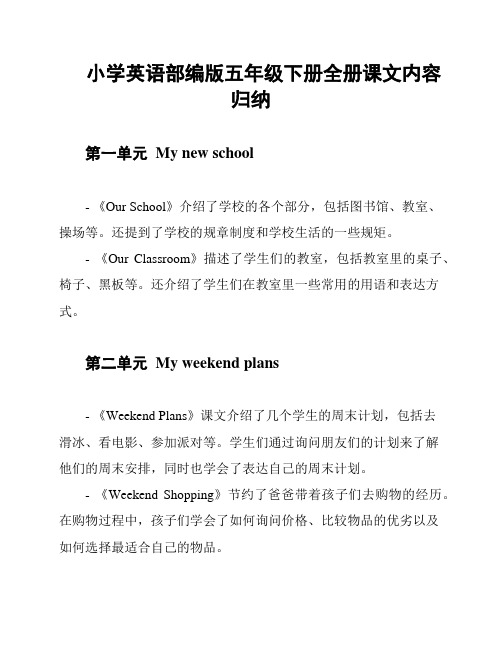
小学英语部编版五年级下册全册课文内容归纳第一单元 My new school- 《Our School》介绍了学校的各个部分,包括图书馆、教室、操场等。
还提到了学校的规章制度和学校生活的一些规矩。
- 《Our Classroom》描述了学生们的教室,包括教室里的桌子、椅子、黑板等。
还介绍了学生们在教室里一些常用的用语和表达方式。
第二单元 My weekend plans- 《Weekend Plans》课文介绍了几个学生的周末计划,包括去滑冰、看电影、参加派对等。
学生们通过询问朋友们的计划来了解他们的周末安排,同时也学会了表达自己的周末计划。
- 《Weekend Shopping》节约了爸爸带着孩子们去购物的经历。
在购物过程中,孩子们学会了如何询问价格、比较物品的优劣以及如何选择最适合自己的物品。
- 《Busy Weekend》故事中的孩子们都有一个忙碌的周末。
他们分别参加了电影俱乐部、游泳班和英语角。
通过这个故事,我们了解了孩子们丰富多彩的课余生活。
第三单元 My favorite subject- 《My Favorite Subject》课文中学生们谈论了自己最喜欢的学科,并表达了自己对不同学科的喜好和理由。
他们之间互相交流和讨论,分享了不同学科的特点和魅力。
- 《Music Class》课文介绍了一个音乐课堂上的情景,老师教导学生们如何演奏乐器和唱歌。
学生们通过参与音乐课堂活动,培养了音乐欣赏和艺术表达的能力。
- 《Art Class》课文中学生们在美术课上研究绘画和创作,他们展示了自己的作品并互相欣赏。
通过艺术创作,学生们培养了创造力和审美观。
第四单元 A picnic in the park- 《A Picnic Plan》课文描述了一场学生们组织的郊游活动,包括选择地点、准备食物和活动安排。
学生们通过一起筹划和组织活动,锻炼了团队合作和沟通能力。
- 《A Picnic in the Park》故事中的孩子们在公园里举行了一场愉快的野餐活动。
五年级英语下册知识点总结
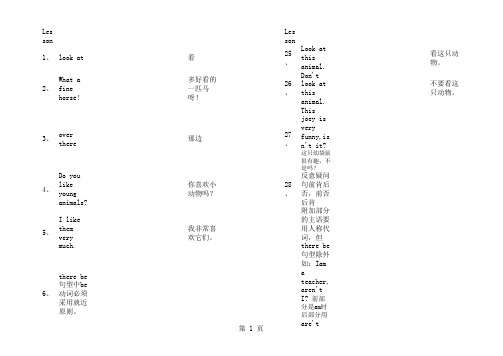
1、look at 看25、Look at this animal.看这只动物。
2、What a fine horse!多好看的一匹马呀!26、Don't look at this animal.不要看这只动物。
3、over there那边27、This joey is very funny,isn't it?这只幼袋鼠很有趣,不是吗?4、Do you like young animals?你喜欢小动物吗?28、反意疑问句前肯后否,前否后肯5、I like them very much.我非常喜欢它们。
附加部分的主语要用人称代词,但there be 句型除外6、there be 句型中be动词必须采用就近原则。
如:Iam a teacher,aren't I?前部分是am时后部分用are'tthere is +不可数名词(water milk) There will be a meeting,won't there?there is +可数名词单数回答时要前后一致。
there are +可数名词复数如:Yes,I am . No,I'm not.Lesson 2Lesson 67、What's this in English?这个用英语怎么说?29、Is this a tiger? Yes,it is. 这是只老虎吗?是的,它是。
8、It's a horse.它是horse.30、is that a lion? No,it isn't. 那是头狮子吗?不,它不是。
9、What do you call it in English?在英语中你们叫它什么呢?31、What can we call it?我们叫它什么?10、We call it a foal.我们叫它foal32、We can call it a cub.我们叫它cub。
五年级英语下册重点知识归纳

五年级英语下册重点知识归纳重点知识归纳:五年级英语下册第一单元本单元的重点词汇包括:eat breakfast(吃早餐)、have class(上课)、play sports(进行体育运动)、exercise(活动、运动)、do morning exercises(早锻炼)、eat dinner(吃晚饭)、clean my room(打扫我的房间)、go for a walk(散步)、go shopping(去购物)、take(研究、上课)、dancing (舞蹈)、take a dancing class(上舞蹈课)、a.m.(上午)、p.m.(下午)和usually(通常地)。
除了以上词汇外,还有其他日常活动,如get up(起床)、eat lunch(吃午饭)、go to bed(上床睡觉)、wash my face(洗脸)、wash my clothes(洗我的衣服)、watch TV(看电视)、play ping-pong(打乒乓球)、play the pipa(弹琵琶)、go swimming(去游泳)、go running(去跑步)、do homework(做作业)和do kungfu(练武术)等。
在频度副词方面,有always(总是、一直,100%)、usually(通常,80%)、often(经常,60%)和sometimes(有时,30%)。
疑问词方面,重点是when(什么时候)和why(为什么)。
本单元的重点句型包括询问别人什么时候做某事的句型及回答和询问别人周末做什么的句型及回答。
对于第一种句型,问句结构为:When do you+动词短语原形+其他?回答结构为:I/we(+频度副词)+动词短语原形+at+具体时间。
需要注意的是,当主语是第三人称单数时,助动词do要变成does。
对于第二种句型,问句结构为:What do you do on the weekend?回答结构为:I(+频度副词)+动词(短语)+其他。
五年级英语下册教案(10篇)
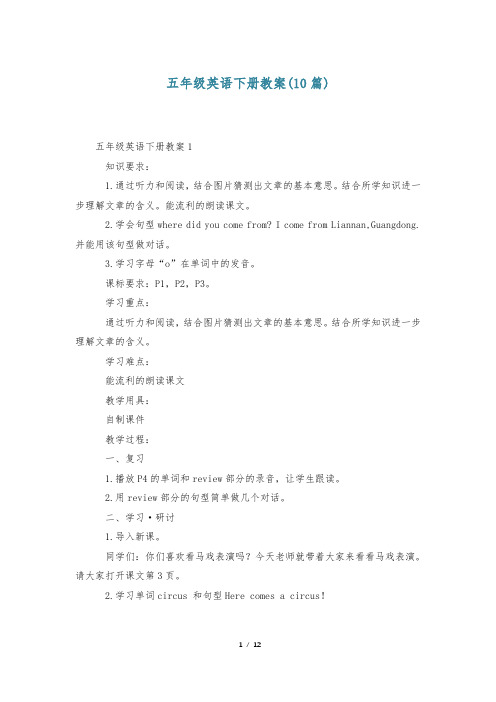
五年级英语下册教案(10篇)五年级英语下册教案1知识要求:1.通过听力和阅读,结合图片猜测出文章的基本意思。
结合所学知识进一步理解文章的含义。
能流利的朗读课文。
2.学会句型where did you come from? I come from Liannan,Guangdong.并能用该句型做对话。
3.学习字母“o”在单词中的发音。
课标要求:P1,P2,P3。
学习重点:通过听力和阅读,结合图片猜测出文章的基本意思。
结合所学知识进一步理解文章的含义。
学习难点:能流利的朗读课文教学用具:自制课件教学过程:一、复习1.播放P4的单词和review部分的录音,让学生跟读。
2.用review部分的句型简单做几个对话。
二、学习·研讨1.导入新课。
同学们:你们喜欢看马戏表演吗?今天老师就带着大家来看看马戏表演。
请大家打开课文第3页。
2.学习单词circus 和句型Here comes a circus!3.学会句型where did you come from? I come from Liannan,Guangdong.并能用该句型做对话。
4.播放课文动画两边,让学生边看动画边联系上下文理解文章的意思。
5.继续播放对话三遍,让学生跟读。
6.让学生朗读两遍。
三、操练1、pair work(练习对话)。
2.检查效果(点名做对话)。
四、学习发音和单词1.让学生猜测单词的意思。
2.播放录音三遍,让学生跟读。
3.讲解字母“o”在单词中的发音规律。
4.齐读后点名读。
5.播放listen and chant的录音让学生跟读,让学生说说他的意思。
五、作业抄写p3的conversation和p8的Sounds and words.六、板书设计Unit One Where were you last month?Where did you come from?I come from Liannan,Guangdong. Here comes a circus!五年级英语下册教案2一、教材分析小学英语教学目的是激发学生学习英语的兴趣,培养他们学习英语的积极态度;使他们初步具备用因英语进行简单日常交流的能力。
人教版五年级英语下册全册知识点总结
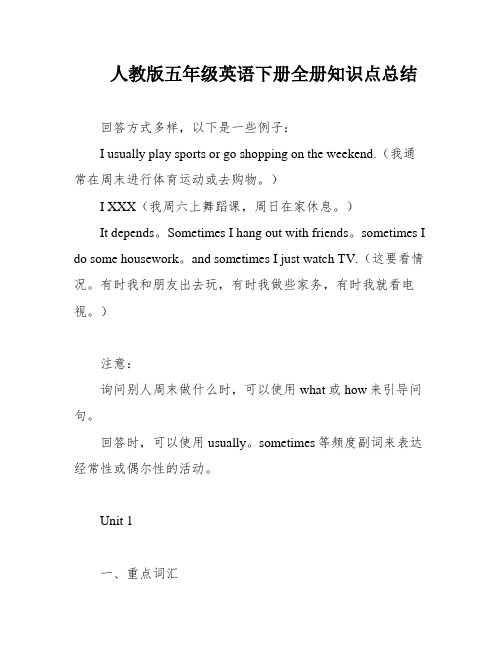
人教版五年级英语下册全册知识点总结回答方式多样,以下是一些例子:I usually play sports or go shopping on the weekend.(我通常在周末进行体育运动或去购物。
)I XXX(我周六上舞蹈课,周日在家休息。
)It depends。
Sometimes I hang out with friends。
sometimes I do some housework。
and sometimes I just watch TV.(这要看情况。
有时我和朋友出去玩,有时我做些家务,有时我就看电视。
)注意:询问别人周末做什么时,可以使用what或how来引导问句。
回答时,可以使用usually。
sometimes等频度副词来表达经常性或偶尔性的活动。
Unit 1一、重点词汇吃早餐:eat breakfast 上······课:have。
class进行体育运动:play sports做早操:do morning exercises 打扫我的房间:clean my room 去购物:go shopping舞蹈:dancing上午:a.m.通常地:usually二、其他日常活动起床:get up上床睡觉:go to bed活动,运动:exercise吃晚饭:eat XXX散步:go for a walk研究,上(课):XXX上舞蹈课:take a dancing class下午:p.m.吃午饭:eat XXX洗脸:XXX洗我的衣服:XXX看电视:watch TV打乒乓球:play ping-pong弹琵琶:play the pipa去游泳:go swimming去跑步:go running做作业:do homework练武术:do XXX踢足球:play football打篮球:play basketball三、语音cl→ [cl]:clean。
(完整版)人教版小学PEP英语五年级下册知识点归纳

人教版小学PEP英语五年级下册知识点归纳PEP五年级英语下册各单元知识点Unit 1 My day一、重点词汇。
1.四会词汇:eat breakfast 吃早饭 have···class 上······课play sports 进行体育运动exercise 活动;运动 domorning exercises做早操eat dinner吃晚饭clean my room 打扫我的房间go shopping 去买东西;购物go for a walk 散步take学习;上(课) dancing跳舞;舞蹈 take a dancing class 上舞蹈课2. 三会词汇:when什么时候after 在(时间)后start 开始usually 通常地;惯常地Spain 西班牙late 晚;迟 a.m. 午前;上午 p.m. 午后;下午why 为什么shop 去买东西;购物work 工作last 上一个的;刚过去的sound 听起来好像also 还;也busy 忙的 need 需要play 戏剧;剧本letter 信live 居住island 岛always 总是;一直cave 山洞;洞穴go swimming 去游泳 win 获胜二、其他日常活动。
get up起床 eat lunch吃午饭 go to bed 上床睡觉wash my face洗脸 wash my clothes 洗我的衣服 watch TV看电视play ping-pong打乒乓球 playthe pipa弹琵琶 go swimming去游泳go running去跑步 do homework 做作业 do kung fu练武术play football踢足球 play basketball打篮球三、频度副词。
always总是,一直(100%) usually通常(80%)often 经常(60%) sometimes(30%)有时四、疑问词。
人教版小学英语五年级下册各单元知识点

人教版小学英语五年级下册各单元知识点Unit 1: My dayIn this unit, students learn to talk about their daily routines and the time in English. They also learn to express their likes and dislikes about different activities.Some of the key vocabulary words and phrases include:- Get up- Have breakfast- Go to school- Have lunch- Have dinner- Watch TV- Play games- Read books- Do homework- Brush teeth- Go to bedStudents are introduced to the verb "to be" and learn how to make simple sentences with it, such as "I am happy" or "He is tired". They also practice asking and answering questions using "what", "when", and "where".Unit 2: Colors and clothesIn this unit, students learn to identify and name colors, clothing items, and accessories in English. They also learn to describe their own clothing and what they are wearing.Some of the key vocabulary words and phrases include:- Red- Blue- Green- Yellow- Orange- Purple- Pink- White- Black- T-shirt- Dress- Pants- Skirt- Shoes- Socks- Hat- Bag- SunglassesStudents learn about the use of prepositions such as "on", "in", and "under" to describe clothing and daily routines. They also practice using adjectives to describe colors and clothing, and learn to ask and answer questions such as "What color is your shirt?" and "What are you wearing today?"Unit 3: Food and drinksIn this unit, students learn to talk about different types of food and drinks in English. They also learn about healthy eating habits and meal times.Some of the key vocabulary words and phrases include:- Pizza- Sandwich- Rice- Noodles- Salad- Fruit- Vegetables- Juice- Milk- Water- Breakfast- Lunch- Dinner- SnackStudents learn about the use of countable and uncountable nouns when talking about food and drinks. They also practice using the articles "a", "an", and "the" correctly. They learn to express likes and dislikes about different foods and drinks using the verb "to like" and "to dislike".Unit 4: Holidays and festivalsIn this unit, students learn about different holidays and festivals celebrated around the world. They learn to talk about the traditions, customs, and symbols associated with these celebrations.Some of the key vocabulary words and phrases include:- Christmas- Easter- Halloween- New Year- Valentine's Day- Thanksgiving- Dragon Boat Festival- Mid-Autumn Festival- Lantern Festival- Traditions- Customs- Symbols- FireworksStudents learn to ask and answer questions about holidays and festivals. They learn to use vocabulary related to greetings, gifts, and decorations. They also practice using the verb "to celebrate" to talk about different celebrations.Unit 5: Animals and petsIn this unit, students learn about different types of animals and pets. They learn to describe their appearance, behavior, and habitat. Some of the key vocabulary words and phrases include:- Dog- Cat- Fish- Bird- Rabbit- Hamster- Snake- Monkey- Elephant- Tiger- Giraffe- Zoo- Forest- Sea- SkyStudents learn to use adjectives to describe animals, such as "cute", "fierce", or "big". They practice asking and answering questions about pets and their owners, and learn about basic pet care and responsibilities.Unit 6: Weather and seasonsIn this unit, students learn to talk about different types of weather and the four seasons. They learn to express their preferences and activities associated with each season.Some of the key vocabulary words and phrases include:- Sunny- Cloudy- Rainy- Snowy- Windy- Spring- Summer- Fall/Autumn- Winter- Sun- Rain- Snow- Leaves- FlowersStudents learn to use verbs to describe weather and activities, such as "to swim" or "to play snowballs". They also practice using simple present tense to make statements and ask questions. They learn to use adjectives to describe weather, such as "beautiful", "hot", or "cold".Unit 1: My dayIn this unit, students will be introduced to the basic vocabulary and phrases related to their daily routines and the time.The teacher can start by asking students when they usually wake up, and elicit the verb "to get up". Then, the class can work on making sentences like "I get up at 7 o'clock in the morning" or "He gets up early". The teacher can also introduce basic adverbs of frequency, such as "always", "usually", "sometimes", and "never".The class can then move on to discussing meals, such as breakfast, lunch, and dinner. Students can practice using the verb "to have" to describe what they eat and drink, such as "I have cereal and milk for breakfast" or "She has a sandwich for lunch". They can also learn to talk about their favorite foods and drinks, and use expressions like "I like" or "I don't like".The teacher can also introduce basic verbs related to daily activities, such as "to go", "to come", "to watch", "to play", "to read", and "to do". Students can learn to make sentences like "I go to school by bus" or "He plays games after school". The teacher can also teach prepositions of place, such as "at", "in", and "on", todescribe daily routines in more detail.Finally, the class can practice telling time in English, using both the 12-hour and 24-hour clock formats. Students can work on making sentences such as "It's 7 o'clock" or "It's half past nine". Unit 2: Colors and clothesIn this unit, students will learn to identify and name different colors, clothing items, and accessories.The teacher can start by introducing basic colors, such as red, blue, green, yellow, and so on. Students can practice using colors to describe different objects, such as "a red car" or "a blue shirt". The class can also work on making sentences like "I like wearing green clothes" or "She has a pink bag".Next, the teacher can introduce different types of clothing, such as T-shirts, dresses, pants, skirts, shoes, socks, hats, and bags. The class can learn to use prepositions of place to describe clothing, such as "on", "in", or "under". For example, "I wear my T-shirt under my jacket" or "She puts her shoes in the closet".The class can also learn about different accessories, such as sunglasses, watches, and jewelry. Students can practice using vocabulary to describe accessories, and make sentences like "He wears a watch on his wrist" or "She likes wearing earrings". Finally, the teacher can introduce the concept of describing what someone is wearing. The class can practice using adjectives to describe clothing, such as "casual", "formal", or "fancy". They canalso practice asking and answering questions about each other's outfits, such as "What are you wearing today?" or "Do you like my shirt?"Unit 3: Food and drinksIn this unit, students will learn about different types of food and drinks, and healthy eating habits.The teacher can start by introducing basic food vocabulary, such as pizza, sandwich, noodles, salad, fruit, and vegetables. Students can practice using the verb "to have" to describe what they eat and drink, and learn to make sentences like "I have a banana for breakfast" or "She has a salad for lunch".The class can also learn about different types of drinks, such as juice, milk, and water. They can practice using vocabulary to describe drinks and make sentences like "He drinks orange juice in the morning" or "She likes drinking milk before bed".Next, the teacher can introduce vocabulary related to meal times, such as breakfast, lunch, dinner, and snack. The class can learn to use the correct articles "a", "an", and "the" when talking about food and drink, and practice making sentences like "I have an apple for a snack" or "We eat dinner at 6 o'clock".Finally, the class can learn about healthy eating habits, such as eating fruits and vegetables, and drinking enough water. They can practice expressing likes and dislikes about different foods and drinks using the verbs "to like" and "to dislike", and learn to make sentences like "I like apples but I dislike broccoli".Unit 4: Holidays and festivalsIn this unit, students will learn about different holidays and festivals celebrated around the world.The teacher can start by asking students if they celebrate any special holidays or festivals, and elicit different types of celebrations. Then, the class can learn about some of the most common holidays and festivals, such as Christmas, Easter, and Halloween, and discuss their traditions and customs.Next, the class can learn about different traditions and symbols associated with holidays and festivals from different cultures. For example, they can learn about the dragon boat festival in China, the mid-autumn festival in Vietnam, and the lantern festival in Japan.The teacher can also introduce vocabulary related to greetings, gifts, and decorations. Students can practice making sentences like "I gave my mom a card for Mother's Day" or "We decorate the Christmas tree with ornaments". The class can also practice using the verb "to celebrate" to talk about different celebrations.Finally, the class can learn about how holidays and festivals are celebrated in different countries and cultures. They can learn about different foods, costumes, and activities associated with each celebration.Unit 5: Animals and petsIn this unit, students will learn about different types of animals andpets.The teacher can start by asking students what animals they like or dislike, and elicit different types of animals. Then, the class can learn to identify and name different animals, such as dogs, cats, fish, birds, and so on.Next, the class can learn about different types of pets, such as dogs, cats, hamsters, and rabbits. They can practice using vocabulary to describe pets and make sentences like "I have a dog named Max" or "She likes to play with her cat".The teacher can also introduce vocabulary related to animal behavior, such as "cute", "fierce", or "friendly". The class can learn to use adjectives to describe animals, and practice making sentences like "The tiger is fierce but the bunny is cute".Finally, the class can learn about basic pet care and responsibilities. They can learn about feeding, grooming, and playing with pets, and practice making sentences like "I walk my dog every evening" or "She cleans her fish tank every week".Unit 6: Weather and seasonsIn this unit, students will learn to talk about different types of weather and the four seasons.The teacher can start by asking students what their favorite season is, and elicit different types of seasons. Then, the class can learn to identify and name different types of weather, such as sunny, cloudy, rainy, and snowy.Next, the class can learn about the different activities and events associated with each season. For example, they can learn about swimming and camping in the summer, apple picking and Halloween in the fall, skiing and ice skating in the winter, and gardening and Easter in the spring.The teacher can also introduce basic verbs related to weather and activities, such as "to swim", "to play", or "to ski". Students can practice making sentences like "I swim in the lake on hot days" or "She skis with her family in the winter".Finally, the class can learn to express their preferences and dislikes about each season, using expressions like "I love spring because of the flowers" or "I don't like winter because it's too cold". They can learn to use adjectives to describe weather, such as "beautiful", "hot", or "cold", and practice asking and answering questions using simple present tense.。
五年级下册英语课文

五年级下册英语课文 Company number:【WTUT-WT88Y-W8BBGB-BWYTT-19998】Unit 1 what’s your favorite season你最喜欢的季节是什么Xiaoling: look at all the colourful flowers and the beautiful birds in the trees. I really love spring. What’s your favorite season, Ben小玲:看这些五彩缤纷的花儿和树上美丽的小鸟。
你最喜欢的季节是什么,本Ben: Summer. I love swimming and summer is the best time for swimming. Do you like summer, jiamin本:夏季。
我喜欢游泳并且夏季是游泳的最佳时节。
你喜欢游泳吗,嘉明Jiamin: I like swimming,but I don’t like summer. It is too hot. I prefer winter. When it snows, I can make a snowman.嘉明:我喜欢游泳,但是我不喜欢夏天。
它太热了。
我更喜欢冬天。
当下雪的时候,我就可以堆雪人了。
Janet: I don’t like summer and I don’t like winter, either. My favorite season is autumn. It’s very windy and I can fly a kite.珍妮特:我不喜欢夏天,我也不喜欢冬天。
我最喜欢德季节是秋天。
秋天风很大,我可以放风筝。
Unit 2 It’s the middle of winter 现在是中冬“Hi, everyone!” said Ben to his classmates, “This is my cousin Reg. He is visiting me for the summer holidays.”“大家好!”本对同学们说道:“这是我的堂兄弟雷格,他暑假期间来拜访我。
小学五年级英语下册教案5篇(标准版)

小学五年级英语下册教案5篇英语老师要在课堂中要为学生们创设仿真的生活场景,让他们体验情景中使用的语言。
五年级英语教案对所有五年级英语老师来说是不可或缺的,它能够帮助五年级英语老师更好完成教学活动。
你是否在找正准备撰写“小学五年级英语下册教案”,下面收集了相关的素材,供大家写文参考!#696948小学五年级英语下册教案1教学内容:SB(学生用书)和AB(课堂活动用书)学习任务:It’smine\his\hers\Jimmy’s.运用任务:1.做练习2.参加失物招领的游戏教学程序:一、热身复习表演上一节课的课后作业,教师对表演出色的表扬.二、课文导入上节课我们在失物招领处找回自己的东西.我们看课文中还有谁的东西.三、课文教学利用简笔画吸引学生的注意力.教师先画出书包的一部分,向学生提问:What’sthis?然后问:Whosebagisthis?听课文录音,请学生边看插图边跟读,模仿语音语调.学生几人一组分角色表演对话,教师做必要的指导.完成练习,听录音,试着自己连线.四、任务完成完成运用任务1.学生两人一组,一人指着图片问,一人回答,完成对话练习.完成运用任务3.请一名学生读出几个表示所属关系的单词,然后在规定时间让学生根据插图完成选择填空.五、课文学习教师播放录音歌曲,让学生整体感知歌曲大意,再放一遍,鼓励学生跟唱,教师同时教唱歌曲.六、课后作业#696949小学五年级英语下册教案2教学重点:WordsofUnit1教学难点:1.Therearetenpencilsinthebluebox.2.Thereareenoughpencils.教学用具:radioandpictures.教学程序:一、复习ReviewthewordsofModule4二、课文教学(1)SB练习1A.T播放磁带,学生听并思考以下问题。
1)Howmanypeoplearethereinthisdialogue?2)WhatisSamdoing?3)Arethereenoughpencils?B.听第二遍后学生小组讨论上述问题,并派选手参加每个问题的抢答。
五年级英语下册课文及翻译
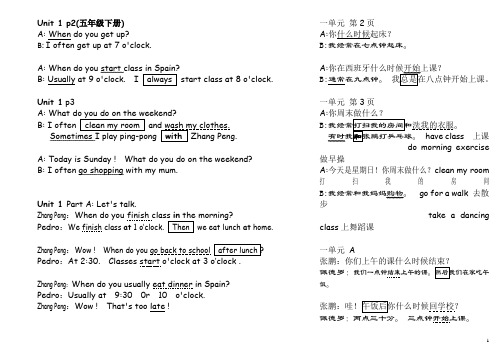
Unit 1 p2(五年级下册)A: When do you get up?B: I often get up at 7 o'clock.A: When do you start class in Spain?B: Usually at 9 o'clock. I start class at 8 o'clock. Unit 1 p3B: I oftenSometimes I play ping-pongA: Today is Sunday ! What do you do on the weekend? B: I often go shopping with my mum.Unit 1 Part A: Let's talk.Zhang Peng:When do you finish classPedro:We finish class at 1 o’clock.we eat lunch at home.Zhang Peng:Wow ! When do you go back to schoolPedro:At 2:30. Classes start o'clock at 3 oZhang Peng:When do you usually eat dinner in Spain?Pedro:Usually at 9:30 0r 10 o'clock. Zhang Peng:Wow ! That's too late ! 一单元第2页A:你什么时候起床?B:我经常在七点钟起床。
A:B:通常在九点钟。
一单元第3页A:B:我经常打扫我的房间和洗我的衣服。
有时我have class 上课do morning exercise 做早操A:今天是星期日!你周末做什么?clean my room 打扫我的房间B:我经常和我妈妈购物。
go for a walk 去散步take a dancing class 上舞蹈课一单元A张鹏:你们上午的课什么时候结束?佩德罗:我们一点钟结束上午的课。
